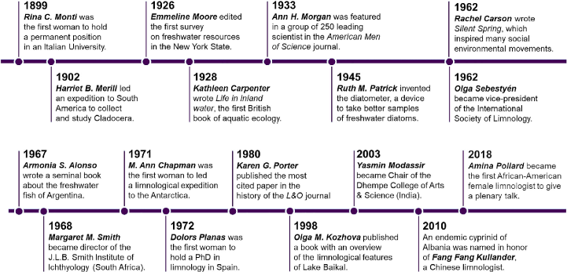 Timeline of the “Herstory” in limnology, where selected achievements of female limnologists are highlighted. Timeline of the “Herstory” in limnology, where selected achievements of female limnologists are highlighted. Last October, a new publication of the group was published in the journal WIREs WATER. In this article, we aimed to bring into the spotlight the past and current situation of female limnologists. Firstly, the historical contribution of women to limnology (HerStory in Limnology) was revised. We compiled biographical information including the name, bibliography, and relevant contributions of 73 female limnologists, from different countries, periods and disciplines (https://zenodo.org/record/7104480#.Y5rx4XbMK3A). Secondly, we analyzed the present situation of female limnologists. We highlighted how the current metrics used to evaluate scientific performance could be detrimental for women’s career, and how women are underrepresented in awards and positions of maximum responsibility in the scientific sphere, hindering their visibility. Here you have some shocking/worrying numbers to illustrate our findings:
The article finishes with a summary of initiatives working for gender equity in the field of limnology, including our work as a Gender and Science Group of the Iberian Association of Limnology (www.genderlimno.org), the Earth Science Women's Network (https://eswnonline.org/) or the Justice, equity, diversity, and inclusion (JEDI) task force by the Society for Freshwater Science (https://freshwater-science.org/justice-equity-diversity-inclusion-jedi-task-force). This article raises awareness of barriers that women faced and still face, and encourages to embrace models of leadership and scientific management different from the ones currently established. Only this way, we will be able to achieve gender balance not only in our professional careers, but also in the other dimensions of our lives. Read the full article here: https://doi.org/10.1002/wat2.1616 Núria Catalán, Maria Anton-Pardo, Anna Freixa, Pablo Rodríguez-Lozano, Mireia Bartrons, Susana Bernal, Ana Genua-Olmedo, Clara Mendoza-Lera, Gabriela Onandía, Xavier Benito, María Mar Sánchez-Montoya, Miguel Cañedo-Argüelles Iglesias, Ada Pastor, Anna Lupon. 2022. Women in limnology: From a historical perspective to a present-day evaluation. WIREs WATER, e1616. This post was written by Maria Anton-Pardo, a lecturer on zooplankton, meta-communities and temporary aquatic ecosystems at the Universidad Rey Juan Carlos, Spain.
2 Comments
10/5/2023 09:13:39 pm
<a href="https://www.getbodyinshape.net/">Muscle Gains By Alternative To Anabolic</a>
Reply
10/5/2023 09:14:36 pm
<a href="https://www.fitnessguidefg.com/">https://www.fitnessguidefg.com/</a>
Reply
Leave a Reply. |
CategoriesArchives
March 2024
AuthorDifferent members of the Gender and Science AIL group will contribute to the Blog, as well as invited collaborators. |

 RSS Feed
RSS Feed